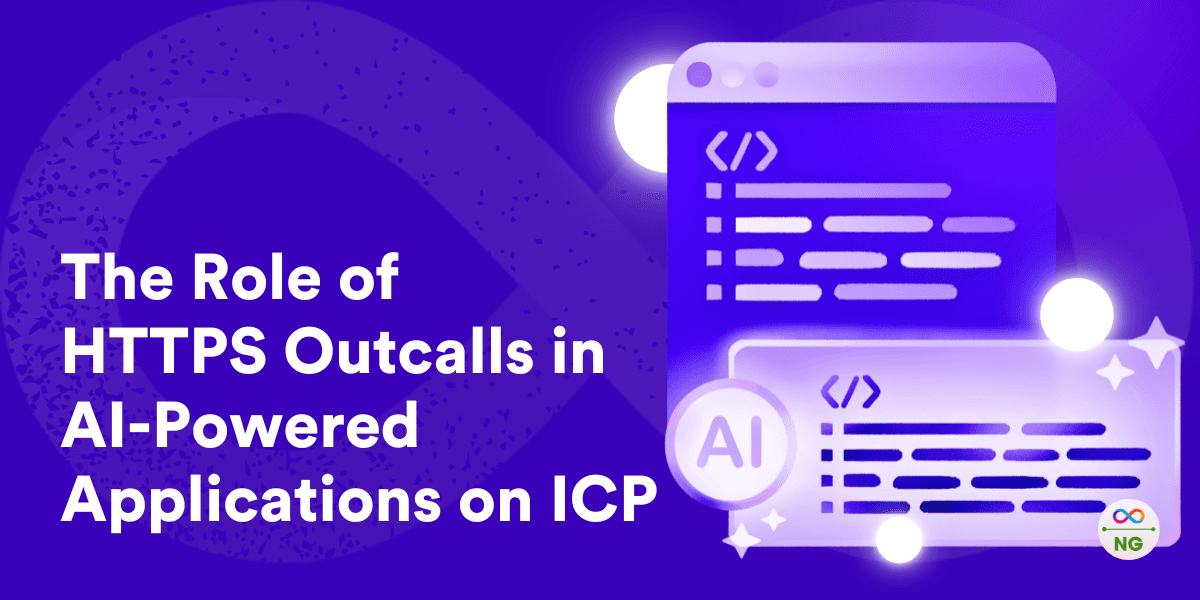
Initially designed to host fully on-chain applications without reliance on traditional cloud services, ICP is now pioneering the fusion of blockchain with artificial intelligence (AI).
We're witnessing ICP transform into a platform where AI models can be deployed, trained, and executed directly on-chain. This opens up a whole new realm of possibilities, from decentralized AI marketplaces to AI-powered DAOs, and, of course, the focus of our discussion: HTTPS outcalls—a feature that connects canister smart contracts with external data sources. But what does this mean for AI applications, and how does it address previous challenges?
The Challenge of Closed Blockchain Environment & The Game Changer: HTTPS Outcalls on ICP
Traditionally, one of the biggest hurdles for AI-powered applications on blockchain has been access to real-time data. Most blockchains operate in a closed environment where smart contracts can only interact with on-chain data, severely limiting their capabilities. AI models, however, require vast amounts of external data for:
- Training and fine-tuning models.
- Fetching up-to-date information for real-world decision-making.
- Integrating with existing APIs, such as cloud-based AI services and external datasets.
Before HTTPS outcalls, developers had to rely on oracles or intermediary off-chain services to fetch real-world data. This added complexity, increased costs, and introduced potential security risks due to external dependencies.
ICP’s HTTPS outcalls solve this problem by allowing smart contracts (canisters) to make direct, secure HTTPS requests to the internet without needing third-party intermediaries. This feature enables AI-powered dApps to seamlessly pull in external data while maintaining the integrity, security, and decentralization that ICP is known for.
How HTTPS Outcalls Empower AI on ICP
Fetching Real-Time Data for AI Models
- AI-powered applications on ICP can now retrieve live data from news sources, financial markets, weather APIs, and more.
- AI bots and analytics tools can operate with real-time insights, improving accuracy and usability.
Decentralized AI Model Hosting
- Instead of relying on centralized cloud providers, developers can host and execute AI models directly on-chain while still accessing external knowledge bases.
- This ensures that AI remains transparent, censorship-resistant, and fully verifiable.
Improving Smart Contract Functionality
- AI-enhanced smart contracts can autonomously interact with off-chain services, such as verifying identities, processing payments, or retrieving external computations.
- ICP’s unique ability to scale enables canisters to execute AI-based logic efficiently, improving dApp performance.
AI-Powered Decision-Making in DAOs and DeFi
- AI models running on ICP can dynamically adjust smart contract parameters, making autonomous organisations and decentralized finance (DeFi) platforms more adaptive and intelligent.
Example: AI can analyse market trends and suggest optimised liquidity pool allocations or detect anomalies to prevent exploits.
Unlocking The Future Possibilities
As ICP continues to expand its AI capabilities, HTTPS outcalls will play an important role in shaping the future of decentralized AI applications. One of the most anticipated advancements is on-chain AI training.
AI models could be trained directly on ICP, leveraging secure access to external training datasets through HTTPS outcalls. This would allow AI to evolve and adapt without relying on centralized computing resources, ensuring a more decentralized and censorship-resistant approach. The seamless integration of real-time data would create a dynamic AI training environment, paving the way for innovative decentralized AI solutions.
Another exciting possibility is the emergence of decentralized AI marketplaces. Developers might create AI-driven prediction markets or knowledge-sharing platforms that fetch real-time data without relying on centralized intermediaries. These marketplaces could enable the trading of AI models and datasets across the ICP ecosystem, making powerful AI tools accessible to a broader audience. HTTPS outcalls would ensure that AI-powered platforms can continuously interact with external data sources for improved accuracy and efficiency, removing the barriers of data silos and centralization.
The potential for AI-powered DAOs is another area of significant interest. Using HTTPS outcalls, DAOs can access real-world data to make informed decisions, transforming governance and operations.
AI algorithms could analyse economic trends, user behaviour, and external factors to guide DAO governance mechanisms, creating a smarter, more autonomous decision-making system. This integration would enhance transparency, automation, and efficiency in decentralized organizations, making DAOs more adaptive and responsive to external changes.
Supply chain management is another sector that could greatly benefit from AI-driven solutions powered by HTTPS outcalls. AI-powered supply chain applications could track goods, optimise logistics, and enhance transparency across global trade networks. By integrating real-time shipping and inventory data, AI models could predict supply chain bottlenecks and offer proactive solutions.
This would be especially beneficial in industries requiring precise logistics, such as pharmaceuticals, agriculture, and e-commerce, ensuring efficiency and reducing delays.
The healthcare industry could also experience groundbreaking advancements with AI-based medical applications on ICP. Through verifiable HTTPS outcalls, medical data could be securely provided to AI models for diagnosis and treatment recommendations.
Decentralized AI models on ICP could assist healthcare professionals by analysing vast amounts of medical research and patient data while maintaining strict data privacy and security. This approach would ensure compliance with data protection regulations while enhancing AI-driven healthcare solutions, ultimately improving patient outcomes.
Conclusion
With HTTPS outcalls, ICP has removed one of the most significant limitations preventing AI from thriving on the blockchain. This breakthrough enables direct access to external data, allowing AI-powered dApps to function autonomously while preserving decentralization.
As developers continue to push the boundaries, ICP is set to become a key player in the decentralized AI revolution, bridging the gap between blockchain and real-world intelligence.